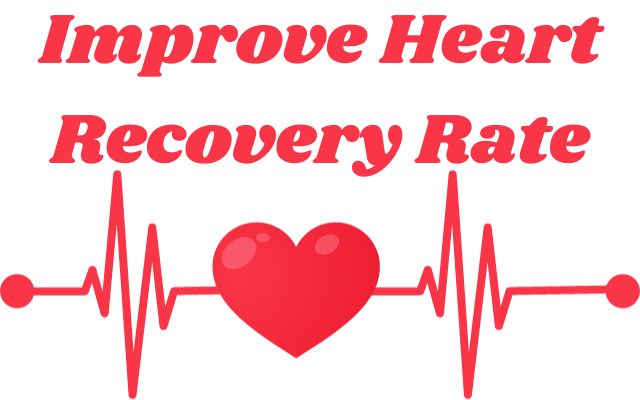How to Improve Heart Recovery Rate

Engaging in regular exercise can help improve heart recovery rate, indicating better cardiovascular fitness. Your heart is a remarkable organ, constantly working to pump oxygen-rich blood to every part of your body. Maintaining a healthy heart is essential for a long and active life. One crucial aspect of heart health is the recovery rate. It’s like a fitness indicator for your heart, telling you how efficiently it bounces back after exercise or stress. In this article, we’ll explore simple and effective ways to improve your heart recovery rate naturally.
What Is Heart Recovery Rate?
Heart recovery rate is the speed at which your heart rate returns to normal after physical activity or stress. A quicker recovery rate indicates better cardiovascular fitness and a healthier heart.
Why Is It Important?
A faster heart recovery rate is associated with various health benefits, including:
- Reduced risk of heart disease
- Improved overall cardiovascular health
- Enhanced endurance and stamina
- Better stress management
10 Ways to Improve Heart Recovery Rate
1. Regular Exercise
Engaging in regular physical activity, such as walking, jogging, or cycling, can strengthen your heart. Aim for at least 150 minutes of moderate-intensity exercise per week.
2. Stay Hydrated
Proper hydration helps your heart pump blood more efficiently. Drink enough water throughout the day, especially during and after exercise.
3. Balanced Diet
A heart-healthy diet rich in fruits, vegetables, lean proteins, and whole grains can improve your heart’s function and recovery rate.
4. Manage Stress
Stress can strain your heart. Try relaxation techniques like deep breathing, meditation, or yoga to keep stress levels in check.
5. Adequate Sleep
Getting 7-9 hours of quality sleep each night allows your heart to recover and rejuvenate.
6. Avoid Smoking
Smoking damages your heart and slows down recovery. Quitting smoking is a significant step toward a healthier heart.
7. Limit Alcohol
Excessive alcohol can affect heart function. Consume in moderation, if at all.
8. Maintain a Healthy Weight
Being overweight puts extra strain on your heart. Aim for a healthy weight through diet and exercise.
9. Regular Check-ups
Visit your healthcare provider for regular check-ups to monitor your heart health and address any issues promptly.
10. Stay Hydrated
Drinking enough water is essential for heart health. It helps with blood circulation and overall cardiovascular function.
Monitoring Your Heart Rate
To measure your heart recovery rate:
- After exercise, note your heart rate.
- Wait for a minute and check your heart rate again.
- The faster your heart rate returns to near your resting heart rate, the better your heart recovery rate.
FAQ
- What is heart recovery rate, and why is it important?
Heart recovery rate is the speed at which your heart rate returns to normal after physical activity or stress. It’s important because a quicker recovery rate is a sign of better cardiovascular health and fitness.
- How can regular exercise help improve heart recovery rate?
Regular exercise strengthens the heart, making it more efficient and helping it recover faster after exertion.
- Can improving heart recovery rate reduce the risk of heart disease?
Yes, a faster heart recovery rate is associated with a reduced risk of heart disease. It’s a positive sign of overall heart health.
- Is there an ideal heart recovery rate to aim for?
There’s no specific ideal rate, as it varies from person to person. The key is to work on improving your own recovery rate over time.
- What role does hydration play in heart recovery rate?
Staying well-hydrated is essential for optimal heart function. Dehydration can slow down the recovery rate, so it’s important to drink enough water.
- Can stress really impact heart recovery rate?
Yes, stress can affect heart recovery. High stress levels make the heart work harder, which can result in a slower recovery rate. Practicing stress-reduction techniques can help.
- How does smoking affect heart recovery rate?
Smoking damages the heart and can lead to a slower recovery rate. Quitting smoking is a crucial step toward improving heart health.
- Is it necessary to limit alcohol intake to improve heart recovery rate?
Excessive alcohol consumption can affect heart function. It’s advisable to limit alcohol intake or consume it in moderation for better heart health.
- Can heart recovery rate improve with better sleep patterns?
Yes, getting adequate sleep allows your heart to recover and function more efficiently. Aim for 7-9 hours of quality sleep each night.
- Can these changes help someone who already has heart disease?
These lifestyle changes can benefit individuals with heart disease by improving their overall heart health and potentially enhancing recovery rate. However, it’s essential to follow a healthcare provider’s advice for managing heart disease.
Conclusion
Improving your heart recovery rate is a vital step towards a healthier heart and a better quality of life. By incorporating these ten simple lifestyle changes, you can enhance your cardiovascular health and reduce the risk of heart disease. Your heart is your most essential muscle; treat it with care, and it will repay you with years of vitality and well-being.



